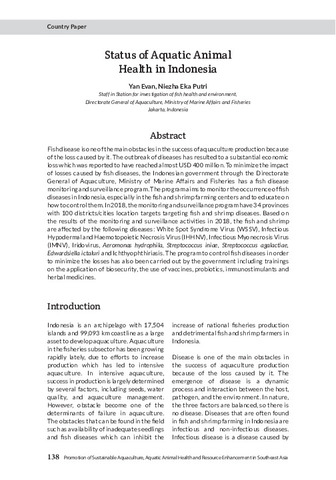Status of aquatic animal health in Indonesia
Share
Abstract
Fish disease is one of the main obstacles in the success of aquaculture production because of the loss caused by it. The outbreak of diseases has resulted to a substantial economic loss which was reported to have reached almost USD 400 million. To minimize the impact of losses caused by fish diseases, the Indonesian government through the Directorate General of Aquaculture, Ministry of Marine Affairs and Fisheries has a fish disease monitoring and surveillance program. The program aims to monitor the occurrence of fish diseases in Indonesia, especially in the fish and shrimp farming centers and to educate on how to control them. In 2018, the monitoring and surveillance program have 34 provinces with 100 districts/cities location targets targeting fish and shrimp diseases. Based on the results of the monitoring and surveillance activities in 2018, the fish and shrimp are affected by the following diseases: White Spot Syndrome Virus (WSSV), Infectious Hypodermal and Haemotopoietic Necrosis Virus (IHHNV), Infectious Myonecrosis Virus (IMNV), Iridovirus, Aeromonas hydrophila, Streptococcus iniae, Streptococcus agalactiae, Edwardsiella ictaluri and Ichthyophthiriasis. The program to control fish diseases in order to minimize the losses has also been carried out by the government including trainings on the application of biosecurity, the use of vaccines, probiotics, immunostimulants and herbal medicines.
Suggested Citation
Evan, Y., & Putri, N. E. (2021). Status of aquatic animal health in Indonesia. In F. A. Aya, L. D. de la Peña, N. D. Salayo, & E. A. Tendencia (Eds.), Proceedings of the International Workshop on the Promotion of Sustainable Aquaculture, Aquatic Animal Health, and Resource Enhancement in Southeast Asia (pp. 138–149). Tigbauan, Iloilo, Philippines: Aquaculture Department, Southeast Asian Fisheries Development Center.



